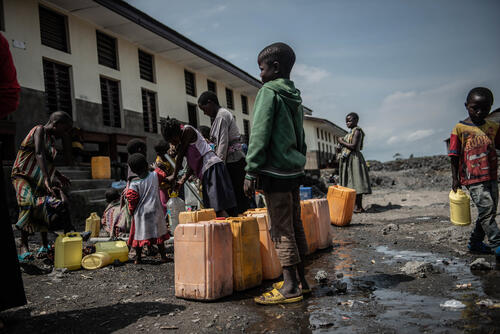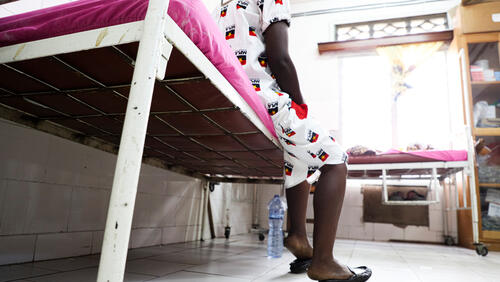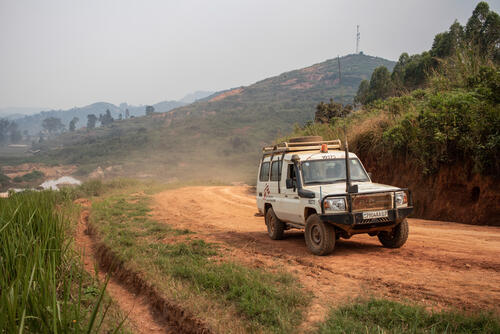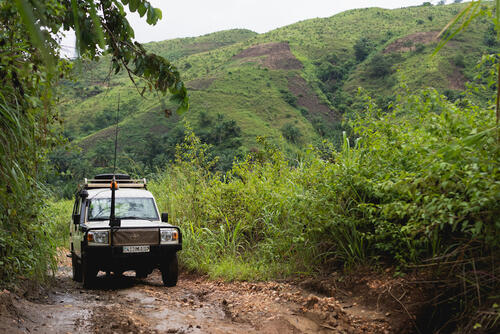Nearly two weeks after the eruption of volcano Mount Nyiragongo, in northeastern Democratic Republic of Congo (DRC), many people are struggling to survive in the areas to where they fled. Despite ongoing seismic activity and official warnings, many displaced people are returning to Goma searching for food, water, and medical care. Médecins Sans Frontières (MSF) is scaling up our support, but more humanitarian aid is still urgently needed.
Thousands displaced with a lack of shelter, food, water
Of the 400,000 people who fled the city of Goma – the capital of North Kivu province – in the aftermath of the eruption, some 234,000 are still on the move, displaced across different towns in North and South Kivu provinces. This includes 60,000 people in Kirotshe health zone, and 77,000 people in Rutshuru, 60 kilometres north of Goma. People had to leave their houses in a hurry, and many took nothing with them.
“Most of us fled with nothing, without money,” says Magene David, one of the displaced people who went to Sake in search of shelter. “MSF provides us water, and this help us, but we have nothing to eat. We sleep outdoors, in the cold, with no blankets.”
Most of us fled with nothing, without money... we have nothing to eat. We sleep outdoors, in the cold, with no blankets.Magene David, displaced person in Sake.
In both Kirotshe health zone and in Rutshuru, many people have not been able to find shelter in the host communities and are living in makeshifts settlements or in public buildings like schools, churches, and mosques. Worse, many are sleeping in the open air, such in stadiums. In the town of Sake, there is a lack of drinking water, food, and shelter. People are also finding it difficult to access healthcare, and access to latrines also remains an issue, with the volcanic ground making it difficult to create clean and functional latrines.
MSF scales up response across North and South Kivu provinces
MSF teams are responding in multiple places across North and South Kivu provinces, including in Kirotshe health zone, Rutshuru, Sake, and in and around Goma. We are improving water and sanitation facilities in places where the displaced people are settled, building latrines, handwashing points, and showers.
We are also providing medical care and improving access to healthcare for people across the two provinces in the locations we’re working. Our teams are supporting Rutshuru hospital and the health facilities in the surrounding area, providing medical care, malnutrition screening and referring more complicated cases to Rutshuru hospital. MSF is also improving the access to water and sanitation in these facilities and is building tents to accommodate mobile clinics in the most crowded areas.
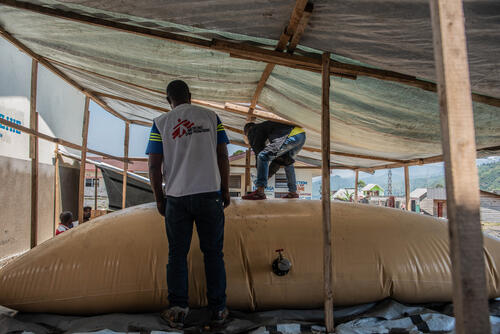
In Goma and surrounding areas, our teams are providing free basic healthcare consultations, and medicine and hygiene items to the displaced. MSF medical teams are also reinforcing cholera surveillance and monitoring systems in four health centres in the city, where we are already supporting cholera-related activities in collaboration with the Ministry of Health.
Some 200 children living on the streets of Goma and supported by MSF are receiving food, water and sanitation items. Through supported health centres in Goma, we’re also ensuring people living with HIV have access to vitally-needed supplies of antiretroviral medications.
On the now re-opened road between Goma and Rutshuru, MSF works with existing clinics and has set up an additional consultation point in Kibumba. Located around six kilometres from the lava flow, teams have conducted some 170 consultations between 29 and 31 May. We will also provide water to Kibumba health centre and hospital, situated three kilometres from the main road, where some displaced people are being hosted.
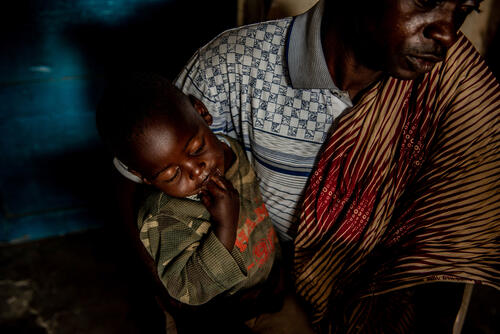
Sake, 25 kilometres from Goma, now hosts an estimated 36,000 displaced people, putting additional pressure not only on the local health facilities, but also on the water supply. MSF teams are providing free basic medical care in Sake health centre, referring more complex cases to the general hospital in Kirotshe. In five days, the medical teams have carried out more than 1,500 consultations. We’re also providing clean water and a total stock capacity of 180,000 litres has been installed; three trucks make eight to 10 trips per day each to keep the water supply bladders filled.
On the watch for cholera
More than 90 MSF health promotion staff are also supporting the emergency intervention in Sake, identifying sick people and directing them to the health centre, as well as providing information about hygiene, COVID-19, and cholera.
Cholera, a waterborne disease, is endemic in the area and there is concern that an outbreak can arise due to the poor conditions in which displaced people are living. To avoid an outbreak, we are providing clean water to host and displaced communities, and have distributed 243,000 litres in the first four days of our activities. Chlorination points and latrines were also built to improve the water and sanitation situation in Sake and prevent the spread of disease.



